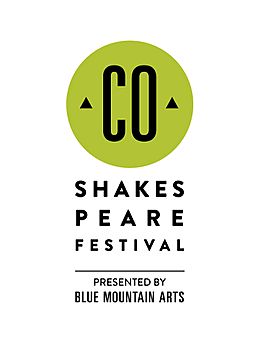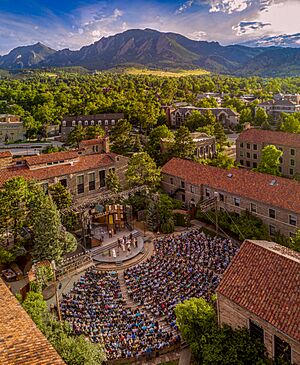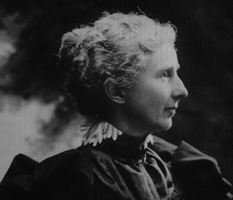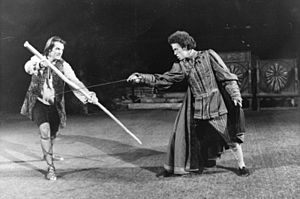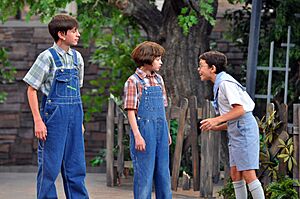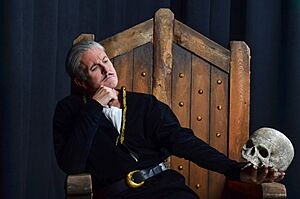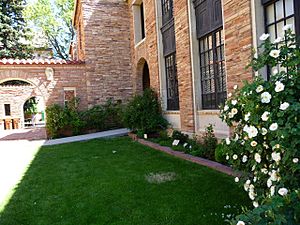Colorado Shakespeare Festival facts for kids
The Colorado Shakespeare Festival is a professional theater group. It works with the University of Colorado at Boulder. The festival started in 1958. This makes it one of the oldest Shakespeare festivals in the United States. Its history goes back to the early 1900s.
Every summer, about 25,000 people come to the festival. They watch plays by Shakespeare and other classic or modern works. These shows happen at the Mary Rippon Outdoor Theatre and the indoor University Theatre.
The festival team includes professional actors, directors, and designers. They come from all over the United States and the world. Student interns from across the nation also join them.
Timothy Orr is the current artistic director. He was hired in 2014. Before that, he was an actor and associate director for the festival.
In 2020, the festival had to cancel its season. This was because of the worldwide COVID-19 pandemic. It started again in 2022. In 2023, plans were announced to improve the Mary Rippon Outdoor Theater.
Contents
The Festival's Story: From Early Plays to Today
How it All Began: 1870s-1944
The festival's roots go back to the very start of the University of Colorado at Boulder. In the 1870s, students performed plays outdoors. These shows happened under cottonwood trees on campus.
In 1901, electric lights became available. This allowed the university to start staging evening performances. This tradition paused during World War I. It restarted in 1919 with Professor George F. Reynolds. He was an expert in Elizabethan theater.
In 1936, Professor Reynolds helped plan the Mary Rippon Outdoor Theatre. Mary Rippon (1850-1935) was the first female professor at the university. She was also one of the first women to teach at a state university in the U.S.
After her death, the university decided to name the new theater after her. Construction began in 1936. It was funded by the university, a government program, and private donations. The theater was officially finished in 1939.
Plays didn't start there until 1944. James Sandoe, a Shakespeare expert, directed Romeo and Juliet. It was very popular! He then directed The Merchant of Venice in 1945 and Henry IV, Part I in 1946.
Sandoe directed many plays for the festival. His children also acted in the shows. His son Sam and daughter Anne still act in the festival today.
Growing the Festival: 1940s to 1960s
James Sandoe and Professor Jack Crouch had an idea. They wanted to create an annual Shakespeare festival. Crouch took over directing in 1947. Shakespeare plays were performed every year after that.
The Colorado Shakespeare Festival officially started on August 2, 1958. It featured three plays: Julius Caesar, Hamlet, and The Taming of the Shrew. More than 7,000 people attended that first year.
By 1968, the festival had performed 26 of Shakespeare's 37 plays. Only one play, Hamlet, was repeated. One production, Henry V, was even filmed for television in 1961.
Many famous actors have been part of the festival. These include Annette Bening (1980), Jimmy Smits, and Val Kilmer (1988).
Changes and Growth: 1970s and 1980s
The Mary Rippon Outdoor Theatre has been improved over the years. In 1967, stone walkways were added. In 1968, large light towers were built. More changes were made in 1981 to make the stage better for plays.
In 1975, the festival performed Cymbeline. With this play, the Colorado Shakespeare Festival became one of only seven companies in the world to perform all of Shakespeare's plays.
The festival also started new programs. In 1978, they began the Young People's Shakespeare program. It performed shorter versions of plays for the community. This program later offered internships to high school students.
In the 1980s, the festival started hiring top designers, technicians, and directors. They also hired talented graduate students from across the country. This helped the festival's reputation grow.
Shakespeare Quarterly magazine praised the festival in 1980. In 1989, it noted the festival's creative shows. In 1992, Time magazine named CSF one of the best Shakespeare festivals in the nation.
New Ideas and Challenges: 1990s and 2000s
Dick Devin became the artistic director in 1990. He had worked as a lighting designer for the festival since 1981. Under Devin, the festival increased the number of summer plays from three to four.
Sometimes, they also performed non-Shakespeare plays. Examples include Rosencrantz and Guildenstern Are Dead by Tom Stoppard in 1995.
Devin also started a program offering free tickets to other theater shows. This was for people who bought season tickets to the Shakespeare festival. This helped people see more arts events.
The festival faced money problems during this time. These were sometimes covered by the university. Devin stepped down in 2004, partly due to these funding challenges.
Modern Era: 2000s and 2010s
Philip Sneed joined as director in 2006. He was a former CSF actor. Under Sneed, the festival started producing six plays each year. This included non-Shakespeare works like Woody Guthrie’s American Song (2008) and To Kill a Mockingbird (2009).
To Kill a Mockingbird was highly praised by critics. Sneed also brought in Tina Packer from Shakespeare & Company. She presented her five-part work, Women of Will, in 2011.
The festival also produced holiday shows from 2007 to 2011. These included A Christmas Carol and It’s a Wonderful Life.
Sneed also created a "cultural exchange" with a theater in Russia. In 2011, Russian actors performed a play in Boulder. In 2012, CSF actors performed in Russia.
Financial Challenges and New Leadership
In 2011, the festival faced financial difficulties. It had a large shortfall. The university helped by forgiving a large debt in 2012.
The festival also changed how it was managed. Some responsibilities shifted. New positions were created to help with finances and management. The box office and marketing teams also joined with other campus arts programs. This was done to improve efficiency and bring in more money.
In 2013, Philip Sneed left the festival. Timothy Orr, who was the associate director, became the interim director.
The 2013 season was very successful. Ticket sales increased by 17 percent. This helped the festival pay off loans for theater improvements. Critics praised the shows, especially A Midsummer Night’s Dream.
Recent Years: 2014-2015 and Beyond
In April 2014, Timothy Orr was officially named the artistic director. He oversaw the planning for the 2014 season. This included plays like The Tempest, The Merry Wives of Windsor, and Henry IV, Part 1.
The 2014 season was well-received. Critics especially liked I Hate Hamlet. The festival also had sold-out shows of Henry IV, Part 2. These were performed using "original practices." This means they tried to recreate how plays were staged in Shakespeare's time.
The 2014 season was a big success for ticket sales. It topped $800,000 for the first time.
In 2015, the festival performed Much Ado About Nothing and Othello. They also performed Wittenberg, Henry V, and Henry VI, Part 1.
In 2017, the festival completed Shakespeare's full collection of plays for the second time.
Education Programs
The festival has a strong education program. It includes Camp Shakespeare and a School of Theatre for children aged 6 to 18. They also have a school tour. This tour presents shorter Shakespeare plays and workshops. These workshops teach students about topics like bullying and gossip.
These programs bring in a lot of money and grant funding. The anti-violence school tour has even received national attention. It was featured on PBS NewsHour. By the end of 2014, this program had reached over 50,000 Colorado schoolchildren.
Colorado Shakespeare Gardens
The Colorado Shakespeare Gardens started in 1991. These public gardens feature plants mentioned in Shakespeare's plays. The organization offers free garden tours and presentations. Their goal is to grow plants that were common in Shakespeare's time.
Volunteers design, plant, and care for several gardens. These include the Thyme Garden and the Romeo and Juliet Garden. They are located near the Mary Rippon Outdoor Theatre. Plants like chamomile, lily, and rosemary can be found there.
The Colorado Shakespeare Gardens are planning to expand and upgrade. This project is expected to take several years.
Before evening shows, a musical group often performs in the Shakespeare Garden. This is called the Green Shows. They start about 90 minutes before the plays. The Boulder Renaissance Consort has performed there often since the 1980s. For over 30 years, Chuck Wilcox played William Shakespeare. He would answer questions from people enjoying picnics.
Images for kids
 | William Lucy |
 | Charles Hayes |
 | Cleveland Robinson |


